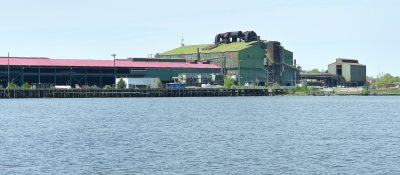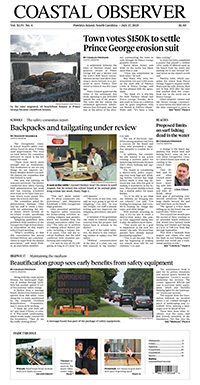Land use
Hearing set to resume on fate of steel mill zoning compliance

A week before a decision is expected on the zoning of the Liberty Steel mill property, the head of the steelworkers union called out the chairman of the city’s Board of Zoning Appeals for negative comments about the mill.
“We find it extremely unethical and a conflict of interest that chairperson Ede Graves, with a biased opinion against our steel mill, has publicly campaigned over the past few years since she moved to Georgetown to get rid of our steel mill,” said James Sanderson, president of United Steelworkers Local 7898. “Clearly, Ede Graves has demonstrated her prejudice and bias against our mill. The USW is of the opinion that Ede Graves isn’t capable to conduct this hearing in a fair, honest and impartial manner.”
In a discussion on the “That Damn Steel Mill” Facebook page in August of 2020, Graves wrote: “Once and for all, it is time to accept it. The steel mill is NOT now and will NEVER again be a major employer in the town. #SHUT IT DOWN!”
“How can anybody conduct an honest, fair and impartial hearing with [those] type of comments directed to the employees [and] their families here at Liberty Steel,” Sanderson said during a press conference on Monday. “She [doesn’t] want the steel mill here. She is dead-set against the steel mill. Stevie Wonder can see that. So how can anybody with any sense of integrity really stand up and participate in something that she’s already made known for well over two years that she’s against.”
Sanderson has repeatedly called on Graves to recuse herself from the Liberty Steel appeal. He even filed an ethics complaint about her, which he later withdrew.
“I feel like, in the long run, she does have integrity and she really wants to show it,” he said. The right thing would be to withdraw, let the vice chairman take over, and not even vote, he added.
Sanderson also said Graves is the only one of the seven members of the board who has publicly shown bias against the mill.
The mill is in a “redevelopment district,” known as REDD, which states that “heavy industrial uses are incompatible when in close proximity to the city’s downtown, waterfront, historic district, residential neighborhoods, and gateway corridors and intersections.”
The city claims the mill failed to comply with the zoning by closing for 365 days within a two-year period. Therefore, it cannot reopen, and manufacturing is no longer allowed under the city’s zoning ordinance.
Both sides disagree on the date that the 365-day clock started. The city says April 22, 2020. Liberty says Feb. 1, 2021. Work restarted at the mill in mid-January.
The appeals board is expected to decide on Wednesday whether the city zoning administrator was correct in determining that the mill was in violation of the grandfather clause in the ordinance that allowed it to operate.
Sanderson also criticized Graves for not moving the hearing to a larger space. In April, 125 people crowded into the city’s courtroom for the hearing. Many people stood for the entire three hours and dozens were turned away.
“I don’t think it’s right for the appeals board to limit people from having input,” Sanderson said. “If you limit the number of people that can get inside of a building to participate in the hearing, is the hearing being conducted in a fair and impartial manner?”
The city is also cracking down on how many people can attend Wednesday’s hearing. There will be a strict limit of 112 people, of which, 80 can be members of the public. No one will be allowed to stand inside the courtroom or hang around in the lobby of the municipal building.
In an email to Sanderson, Graves suggested that Liberty could open its headquarters building or he could open the union hall for steelworkers to watch a livestream of the meeting.
After the three-hour hearing in April, the board voted 4-3 to continue the hearing until June in order to get more information.
Sanderson believes there are people behind the scenes in the city working against the steel mill.
“It does look like there’s a conspiracy, trying to get rid of our steel mill,” he said. “There’s a few people here in Georgetown that do not want that steel mill here because they look at it for redevelopment.”
Sanderson said if the board rules in favor of the city, which could lead to the mill being shut down, the next step is legal action against the appeals board members and/or the city.




